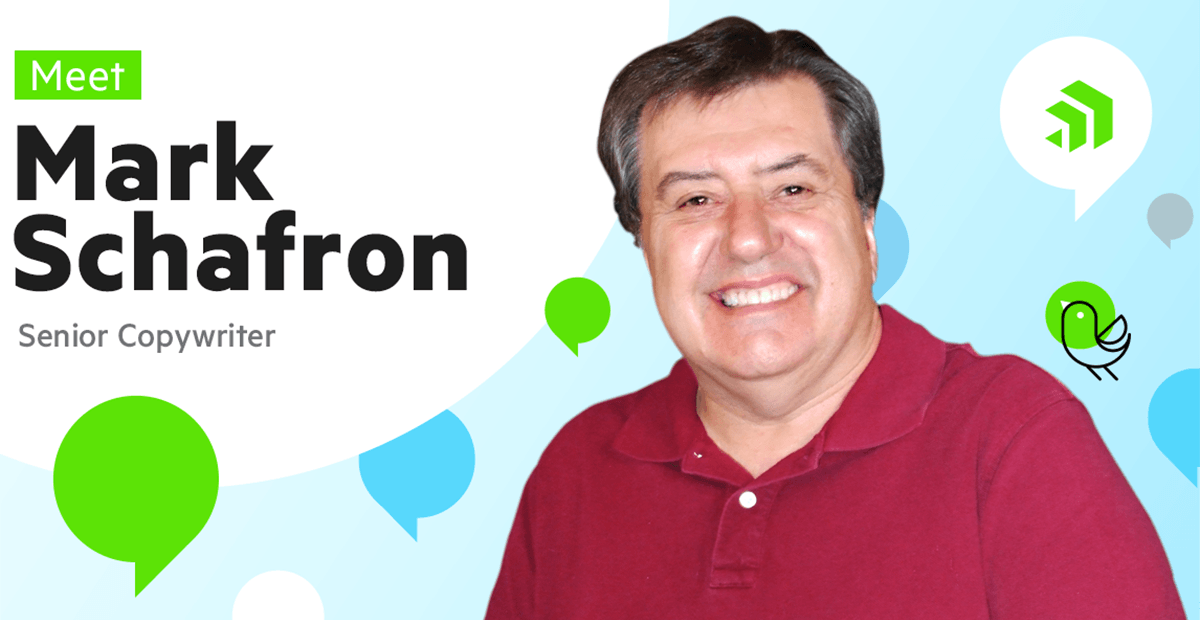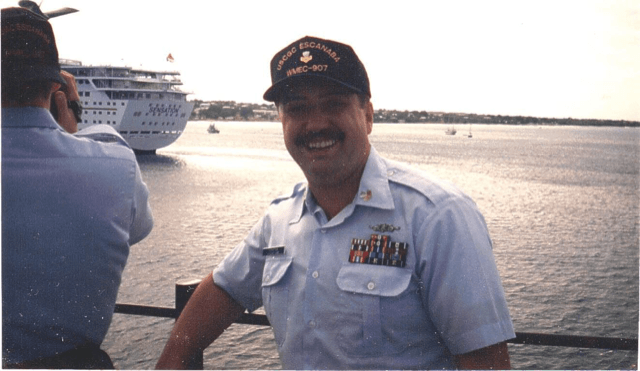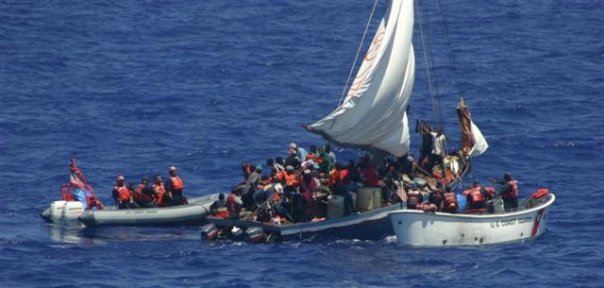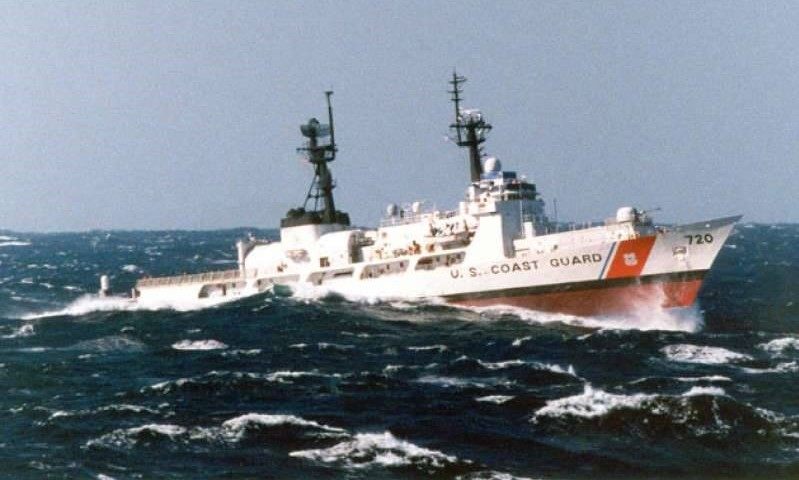Meet Mark Schafron, Senior Copywriter at Progress

Progress people bring diverse experiences to the table and make Progress a special place to work. In this post, meet Mark Schafron, senior copywriter at Progress.
Mark is from Gardner, Massachusetts, and has been at Progress for five years. He’s responsible for writing and coordinating much of the corporate messaging at Progress. And much of the time he’s a jack of all trades for the Progress corporate communications team—a writer, an editor, a mentor, an idea guy, a consummate professional and team player, and even the content team’s silver-tongued, baritone voice-over master for videos.
A 20-year veteran of the U.S. Coast Guard, Mark learned many of the professional, personal and interpersonal skills he uses every day as a petty officer first class. To honor his service on Veterans Day 2020, we sat down with Mark to ask him about his career, his service, and gain some insight into what he’s learned along the way.
See also: Honoring veterans at Progress
What does a petty officer do in the Coast Guard?
A petty officer is the equivalent of a Marine Corps or Army senior sergeant. It’s a senior, non-commissioned officer rank that supervises junior personnel. Everyone has job specialties in the Coast Guard, what they call ratings. Mine was human resources and logistics. So my job was getting material and people from point A to point B—keeping them fed, keeping them paid, taking care of their legal matters, assisting with family matters, arranging for them to have whatever counseling they needed, whether it be stress, whether it be substance abuse. In my day job, I worked most closely with the medical department and the command’s executive officer, our term for the second in command beneath the unit commander.

What other duties did you have in addition to the normal day-to-day responsibilities?
I spent most of my time in what we called our “deep water” fleet—cutters large enough and capable enough to operate at least 200 miles offshore for a minimum of six to eight weeks before refueling. I spent many tours of duty doing humanitarian work off Florida, Cuba and Haiti, where we were picking up economic refugees who were afloat on everything from packing crates, to inner tubes, to some very cleverly built home-made boats.
I was part of boarding parties. I fought shipboard fires. I helped to clean up major and minor oil spills. I performed CPR on victims. We were all trained as EMTs, in small-caliber sidearms and large-scale shipboard weapon systems, in law enforcement technique, including situational de-escalation and arrest, and firefighting and navigation. The Coast Guard is unique among the five branches in that we're the only branch with peacetime missions, which include marine environmental protection, maritime law enforcement, boating safety, fisheries and economic zone enforcement, and narcotics and migrant interdiction, among others. We’re also federal law enforcement officers under the Department of Homeland Security. I spent a lot of time in the Caribbean and Southern Ocean hunting smugglers, in cooperation with foreign navies and coast guards. I also did tons of paperwork and learned an entire language of bizarre acronyms, which is a universal experience in uniform.

What was the best thing about being in the Coast Guard?
There is incredibly beautiful weather at sea. The night sky is indescribably intense and humbling when there is absolutely no light pollution at all. It was breathtaking to see the Southern Cross and the Hale-Bopp comet clear as could be for the first time. From a mission standpoint, I would say probably the refugee missions. That was the most rewarding to me because we saved people’s lives—babies, children, elderly; people who were injured or ill. All that and the camaraderie, sense of belonging and shared purpose.
What was the scariest moment for you?
During narcotic interdiction missions, we so vastly outgunned the bad guys it was never a worry, and when they got tired of running, they would just surrender because they didn’t want to get hurt. So, that wasn’t a big deal and I’m grateful that I never once needed to draw my sidearm in 20 years of service.
Some of the storms at sea could be scary. Seeing and feeling the raw power of 35 or 40-foot waves taking a 370-foot, 3,500-ton ship and just toss it all over the place got your attention and made you focus on your own mortality a bit. I remember being on the bridge of the ship and seeing this wall of water coming. The bow would cut into it and the water would go right over the top of the ship. Bear in mind from water line to the bridge was probably 75 feet, so this was untold tons of seawater blowing up over the bow and going over you, and you see nothing but green water for a few seconds. That and the feeling that the deck is dropping out from under you from the pitching.
We used to call certain classes of ships “vomit comets,” due to their less-than-optimum seakeeping characteristics. Those with weak stomachs were well advised to try to be assigned elsewhere.

When did you join the Coast Guard and how did it make you the person you are today?
Right out of high school. It taught me self-discipline. It taught me teamwork. I saw places and things I likely never would have experienced on my own. I met and worked in close quarters and in sometimes dangerous situations with an absolute rainbow of humanity. It gave me the joy of working toward something greater than myself. To this day, I’m big on chain of command. My military service made me a much more travelled and well-rounded human being, and the toughness and daily challenge of it made me a stronger, more resilient person.
What was the camaraderie like?
I have Coast Guard friends that I’m in touch with to this day. We’ve all scattered to the four winds, but a lot of us stay in touch. The military has a very rough sense of humor. It’s very dry, sarcastic, self-deprecating, and you cut no quarter for anybody—least of all yourself. But if your shipmate is in trouble, you’re going to be the first one there to help them because that’s just the tightness of a military unit. It’s an exclusive society of men and women.
How did you transition into civilian work?
I’d always been fascinated by writing but I had no formal training in it. I was writing in my off-duty time the whole time I was in the service, and eventually through trial and error and the help of a few kind editors along the way, I started to learn my craft. When I retired from active duty, I was able to parlay my freelance clips into a newspaper job. I was with the MetroWest Daily News on the business desk for about a year. Then I kind of stumbled into high tech because that’s what was hot at the time in our area. From the paper, I went to a now-defunct analyst firm that specialized in CAD/CAM, then a job at EMC, now Dell EMC, and I ended up the senior writer there for all their web properties and executive communications, ad copy, promo scripts, I managed their freelance stable, taught and mentored others—the whole thing a corporate copywriter does at the senior or principal level. When that ended, I joined Progress, which so far has been—next to my military service—the best job I’ve ever had.
What is Progress like, and specifically the corporate communications team?
The thing about Progress that strikes me, that reminds me of the things that made me so comfortable in the service is the camaraderie, the sense of shared purpose. You don’t see that at a lot of companies. There’s a lot of dog-eat-dog survival, a lot of politics. You see little of that here. You see a focus on making Progress the best it can possibly be for the sake of our customers and shareholders, and that pride of ownership.
As far as the corporate communications team, I don’t consider them my coworkers, I consider them my friends. I think that’s Progress in a nutshell.
What’s the best part of your job?
For every assignment there’s something, if not new, there’s something different—a new angle. We’re either trying to drive something new in the market or recharacterize ourselves while still being the Progress we always were. There are so many intelligent people, and it’s a privilege for me to work with them and help shape their ideas into text that ultimately will provoke a buying behavior. I love doing that.
What product or aspect of Progress technology excites you?
I love Sitefinity. I really believe in that product. It’s a strong CMS. It’s easy to use. The whole portfolio here is strong, but I’ve always had an affinity for Sitefinity and I’m a big fan of Fiddler Everywhere.
What are you like away from work?
I paint. I write. I kayak, cycle and snowshoe. I’m a gym rat or was until COVID. I garden. I’m the chairman of the planning board here in my community. I’m a trustee of a local charity’s scholarship fund. I was a private pilot, but I’ve let my license lapse. I love to cook and my musical tastes run from Beethoven, to Verdi, to swing revival, grunge and ska.
Can you tell us about your family a little?
I’m a widower. My wife, Andrea, died in 2014 from Leukemia. My daughter, Emily, was 14. My son, Ian, who is an electronics technician, was grown and gone with his own life. I was fortunate in that Emily is made of sturdy stuff, focused and highly intelligent, and together we made it past the thunderclap of her mother’s death and into a new normal. She graduated from Johnson & Wales University with a degree in culinary arts a couple of months ago and is wading into the working world of fine food production. I think she’s going to do well.
You sound like a real Renaissance man.
It sounds pretentious saying it aloud, but that’s what I always wanted to be—a Renaissance man. I’d need five lifetimes to explore everything that interests me. It’s a shame we only get one, but I’m going to try to jam in as much as I can into this life. The act of learning something is very satisfying to me, whether it’s from the printed page or hands-on. What am I going to do with it? I don’t know, but I’ve learned it and that’s rewarding enough.
People often thank me for my service to our country. It was my honor and privilege to serve.
To get to know other Progressers like Mark, read more of our Progress employee interviews here.

